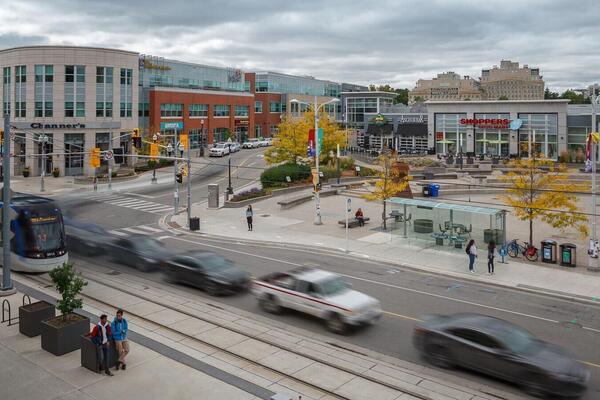
Community unites to drive local health care innovation forward
Solving the region's most pressing health care challenges will require community collaboration

Solving the region's most pressing health care challenges will require community collaboration
By Media RelationsGrand River Hospital Foundation’s Care Never Stops Week (from May 23 to May 28) featured a Health Innovation Challenge in partnership with the University of Waterloo’s Velocity Incubator, a free public talk with Tomi Poutanen, CEO and Co-founder of artificial intelligence-driven health company Signal 1, and a grand finale Rally for Health, with a free public concert.
“Care Never Stops Week is all about bringing our community together for a common cause as we strive to achieve our vision of a world class health system right here, and the Health Innovation Challenge is a valuable opportunity to work together with the incredible minds at the University of Waterloo to foster innovative solutions to local problems in health care,” says Paul McIntyre Royston, President & CEO, Grand River Hospital Foundation. “With the potential for incredible impact, not just locally but on a global scale, this is the type of forward-thinking collaboration that will ultimately enable Waterloo Region to become a leader in health care. Grand River Hospital looks forward to working with partners in health and innovation from throughout our community.”
The Innovation Challenge saw 120 University of Waterloo students broken into 30 teams with Velocity advisers and mentors overseeing each team’s progress. The goal of the 10-day long challenge was to foster locally created solutions to build a world-class health care system in Kitchener-Waterloo.
The local community came out to the Challenge’s final event to cheer on the teams who pitched their best ideas in front of the audience and a panel of expert judges.
“Finding innovative solutions such as the students presented [Saturday] is a crucial component to improve health care outcomes,” says Moazam Khan, Director of Velocity health. “With collaborations like this and partners such as Grand River Hospital Foundation we can strengthen the health tech innovation ecosystem and affect positive change for health care workers and patients”
Winning teams were Embrace, whose app helps connect the community to defend against perinatal depression and other challenges; Bed Connect, which is a bed inventory tech solution to help eliminate wait times; and MediSync, a machine learning powered medical appointment scheduling and documentation application. Each team won $6,000.

The Embrace said interacting with other founders, Velocity advisors and Grand River Hospital Foundation mentors over the course of the 10 days gave the team a sense of confidence. Embrace was founded by Yurii Potsiluienko, Olive Lin, Elizabeth Agyei, and Sophia Badakhshan. Elizabeth and Sophia pitched on behalf of the team at Saturday’s finale event.
“We are hoping to see more opportunities for innovation because so many solutions presented today are doable,” says Elizabeth Agyei, who is an undergraduate student in Biomedical Sciences at the University of Waterloo and founder of Embrace. “We want to see more community involvement for preventative measures to make the community as a whole healthier.”
The University of Waterloo and Velocity believe that the new Innovation Arena, on Waterloo’s Health Sciences campus, will provide that opportunity for health innovation; with bright young founders like Elizabeth working at the intersection of entrepreneurship, technology commercialization, healthcare, research, and more.

Read more
Here are the people and events behind some of this year’s most compelling Waterloo stories

Read more
It Started in Waterloo: An Astronaut's Journey into the Universe of Innovation, narrated by Chris Hadfield, highlights the University of Waterloo’s role in igniting innovation within the region and beyond.

Read more
More than 20 founders from Waterloo highlight the newly unveiled list that celebrates those making the biggest impact inside Canadian tech and innovation
The University of Waterloo acknowledges that much of our work takes place on the traditional territory of the Neutral, Anishinaabeg, and Haudenosaunee peoples. Our main campus is situated on the Haldimand Tract, the land granted to the Six Nations that includes six miles on each side of the Grand River. Our active work toward reconciliation takes place across our campuses through research, learning, teaching, and community building, and is co-ordinated within the Office of Indigenous Relations.